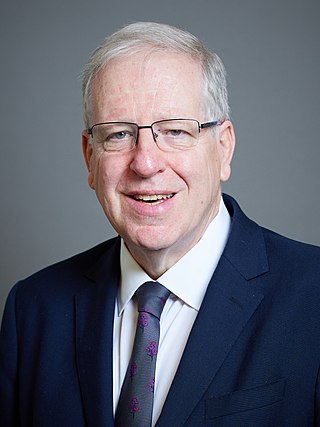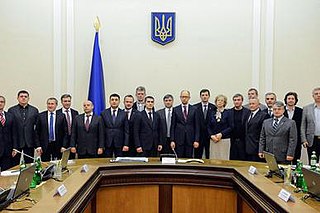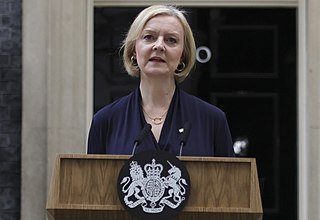
The prime minister of the United Kingdom is the head of government of the United Kingdom. The prime minister advises the sovereign on the exercise of much of the royal prerogative, chairs the Cabinet, and selects its ministers. As modern prime ministers hold office by virtue of their ability to command the confidence of the House of Commons, they sit as members of Parliament.
In political science, a constitutional crisis is a problem or conflict in the function of a government that the political constitution or other fundamental governing law is perceived to be unable to resolve. There are several variations to this definition. For instance, one describes it as the crisis that arises out of the failure, or at least a strong risk of failure, of a constitution to perform its central functions. The crisis may arise from a variety of possible causes. For example, a government may want to pass a law contrary to its constitution; the constitution may fail to provide a clear answer for a specific situation; the constitution may be clear but it may be politically infeasible to follow it; the government institutions themselves may falter or fail to live up to what the law prescribes them to be; or officials in the government may justify avoiding dealing with a serious problem based on narrow interpretations of the law. Specific examples include the South African Coloured vote constitutional crisis in the 1950s, the secession of the southern U.S. states in 1860 and 1861, the dismissal of the Australian federal government in 1975 and the 2007 Ukrainian crisis. While the United Kingdom of Great Britain and Northern Ireland does not have a codified constitution, it is deemed to have an uncodified one, and issues and crises in the UK and its constituent countries are described as constitutional crises.

The prime minister of Italy, officially the president of the Council of Ministers, is the head of government of the Italian Republic. The office of president of the Council of Ministers is established by articles 92–96 of the Constitution of Italy; the president of the Council of Ministers is appointed by the president of the Republic and must have the confidence of the Parliament to stay in office.

Patrick Allen McLoughlin, Baron McLoughlin, is a British politician. A member of the Conservative Party, he first became the Member of Parliament (MP) for West Derbyshire following the 1986 by-election. The constituency became the Derbyshire Dales for the 2010 general election; McLoughlin remained the seat's MP until 2019.

A parliamentary private secretary (PPS) is a member of Parliament (MP) in the United Kingdom who acts as an unpaid assistant to a government minister or a shadow minister. They are selected from backbench MPs as the "eyes and ears" of the minister in the House of Commons.

Shailesh Lakhman Vara is a Ugandan-British Conservative former politician who was the Member of Parliament (MP) for North West Cambridgeshire from 2005 until 2024. He also served as Secretary of State for Northern Ireland from July to September 2022.

Saad El-Din Rafik Al-Hariri is a Lebanese-Saudi businessman and politician who served as the prime minister of Lebanon from 2009 to 2011 and 2016 to 2020. The son of Rafic Hariri, he founded and has been leading the Future Movement party since 2007. He is seen as "the strongest figurehead" of the March 14 Alliance.

The Downing Street chief of staff is the most senior political appointee in the Office of the Prime Minister of the United Kingdom, acting as a senior aide to the Prime Minister of the United Kingdom. The holder of the office retains a highly powerful, non-ministerial position within His Majesty's Government.

The Prime Minister of the Democratic Socialist Republic of Sri Lanka is the most senior member of parliament in the cabinet of ministers. It is the second-most powerful position in Sri Lanka's executive branch behind the president, who is the constitutional chief executive. The Cabinet is collectively held accountable to parliament for their policies and actions. The powers and functions of the Prime Minister has changed several times since the creation of the office in 1947.

Irakli Garibashvili is a Georgian politician and a former business executive who served as the prime minister of Georgia between 22 February 2021 and 29 January 2024. He had previously served as prime minister from 20 November 2013 until his resignation on 30 December 2015. Garibashvili is a member of the Georgian Dream party and has served as the party's chairman since 1 February 2024. He entered politics with his long-time associate Bidzina Ivanishvili, in October 2012.

The first government headed by Arseniy Yatsenyuk was created in Ukraine on 27 February 2014 in the aftermath of the Revolution of Dignity. The cabinet was formed as a coalition of the Batkivschyna, UDAR and Svoboda political parties, the Economic Development and Sovereign European Ukraine parliamentary factions, and a number of unaffiliated MPs. On 24 July 2014, UDAR, Svoboda and 19 independent MPs exited the coalition to pave the way for the early parliamentary elections of late October 2014. Prime Minister Yatsenyuk announced his resignation the same day, but the Verkhovna Rada declined his resignation on 31 July 2014.
In May 2015, protests occurred in Skopje, Republic of Macedonia, against the incumbent Prime Minister Nikola Gruevski and his government. Protests began following charges being brought up against Zoran Zaev, the Social Democratic opposition leader, who responded by alleging that Gruevski had 20,000 Macedonian officials and other figures wiretapped, and covered up the murder of a young man by a police officer in 2011. A protest with up to 2,000 attendees occurred on May 5, seeing clashes between activists and police.

The 1976 sterling crisis was a currency crisis in the United Kingdom. Inflation, a balance-of-payments deficit, a public-spending deficit, and the 1973 oil crisis were contributors.
Several years have been referred to as the Year of three prime ministers or Year of the three prime ministers. This list does not represent all times that a country has had three prime ministers in a single year.

Milion chvilek pro demokracii is a Czech political organisation, which has organized protests and demonstrations against the government of Czech Prime Minister Andrej Babiš and against the 2022 Russian invasion of Ukraine. Its initial goal was a challenge to get one million signatures in support of Babiš's resignation, in protest at his staying in office while the subject of a police investigation, and his previous activities as an operative of the State Security services (STB) under the former communist regime.
These are some of the notable events relating to politics in 2022.

In early July 2022, 62 of the United Kingdom's 179 government ministers, parliamentary private secretaries, trade envoys, and party vice-chairmen resigned from their positions in the second administration formed by Boris Johnson as Prime Minister, culminating in Johnson's resignation on 7 July. Johnson's premiership had been considered in danger for months after several scandals, but it was the Chris Pincher scandal that was identified to have spurred on the resignations. Considered the "last straw" for the Prime Minister, the scandal arose after it was revealed that Johnson had promoted his Deputy Chief Government Whip Chris Pincher, who was publicly facing multiple allegations of sexual assault, to the position despite knowing of the allegations beforehand.
Resignation of Boris Johnson may refer to:

In September and October 2022, the Conservative Party government led by newly appointed prime minister Liz Truss faced a credibility crisis. It was caused by the September 2022 mini-budget and a disorganised vote in the House of Commons over a parliamentary vote to ban fracking, ultimately resulting in the loss of support of Conservative members of parliament (MPs).
"Chaos with Ed Miliband" is a phrase from a 2015 tweet by David Cameron, Prime Minister of the United Kingdom, targeting Ed Miliband, Leader of the Opposition. On 4 May – a few days before the 2015 United Kingdom general election – Cameron, the leader of the Conservative Party, wrote on Twitter that the British public faced a choice between "stability and strong Government" with him, or "chaos with Ed Miliband", who was leading the Labour Party into the election. The political turmoil in the United Kingdom after the 2015 election, and in the wake of Cameron's resignation after the 2016 Brexit referendum, made the tweet "infamous".












